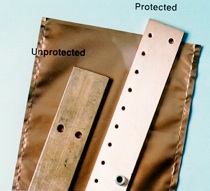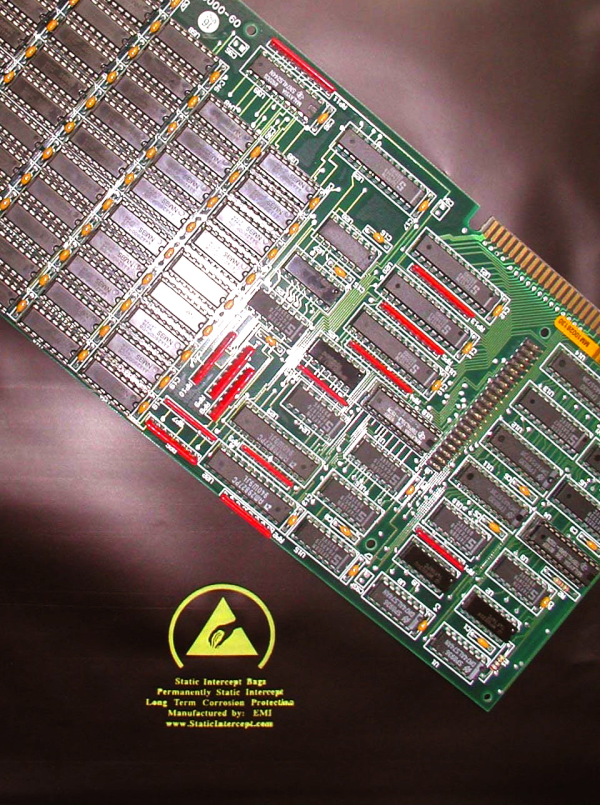In professional basketball there is an adage that two great players are good but a “big three” is needed to win championships. To apply this analogy to manufacturing, the “Big Three” can be deemed as mechanical, electronics, and optics, all functioning efficiently together for the final product to work as designed like a championship basketball team. Point of purchase equipment, bank machines, scanning equipment, inspection equipment, and robotics are all tools and equipment containing the “Big Three”.
Read More
Topics:
electronics packaging

In 1986 Californians voted into law Proposition 65, also known as The Safe Drinking Water and Toxic Enforcement Act of 1986, the purpose of which was to protect the people of California from exposure, via drinking water and consumer products, to toxic substances which have been linked to cancer or birth defects. The act gives authority to California's Office of Environmental Health Hazard Assessment to maintain a list of chemicals shown by the FDA or similar national organizations to be carcinogenic or cause birth defects. Any company found to be dumping any of these substances into drinking water sources can be fined and required to discontinue the dumping. The act also states that any company which exposes consumers to significant amounts of these chemicals via their products must provide a warning on the product or in the store. Failure to comply with the necessary warning means the company can be sued by state or city government attorneys or private attorneys given proper notice to the company and the Attorney General.
Read More
Topics:
vci,
consumer products,
quality assurance
Here are some of the questions we have received and answered most recently:
1. Can I have Intercept in pre-made shrouds/bags? Yes. In addition to our standard on-shelf sizes, Intercept Packaging material can be custom converted to best fit whatever size you need.
2. Does Intercept fit into a reusable packaging program? Absolutely. In fact, it is the best packaging material to choose and a reusable program can be accomplished by choosing Intercept flexible films or fabrics and/or rigid trays, totes and lids.
Read More
Topics:
barrier packaging,
better packaging,
Intercept Technology,
anti-corrosion barrier packaging,
Intercept barrier packaging products

Galvanic corrosion is a type of corrosion which occurs when two different metals are in contact with each other and an electrolyte. Different metals will have different electric potentials when connected in this way. This difference creates an electric current through the electrolyte. In fact, the action of galvanic corrosion is the principle with which batteries are made. Of course this is also the reason batteries have a shelf life. The action of this circuit degrades whichever metal has a lower electric potential. This is described as being less noble, whereas the metal with the higher potential is more noble. The degradation of the less noble metal eventually gets to the point that the circuit is broken by the oxides and salts created by the corrosion. This is the reason not only for a battery’s eventual death, but also for the way it dies, slowly losing electric potential because the anode (lower potential metal or connection) is slowly destroyed by the action of galvanic corrosion.
Read More
Topics:
corrosion,
chloride,
reasons for packaging,
electronics corrosion

To be clear, the difference between electronics and other electrical systems is that electronics include active components to control the flow of electricity, whereas non-electronic electrical systems use mechanical switches or relays. The development of the vacuum tube (the first active component invented) allowed for the creation of far more complex systems than was possible with prior technology. Then solid-state transistors allowed electronics to shrink to sizes unthinkable before. Certainly at this point it is trivial to say that electronics are ubiquitous in society today and will only continue to become more so in the coming years, all the way up to the singularity, at which point we will become our own technology. As electronics have developed through the years, they have been given increasingly more important tasks. From air traffic control to car computers to medical equipment to missile defense, systems which include electronics control and protect our lives everyday. Thus it is essential that we know how to maintain them, for which we must also know how they degrade.
Read More
Topics:
corrosion,
chloride,
electronics packaging,
aluminum,
electronics corrosion
To begin, it must be said that while the term "rust" is defined as iron oxide and therefore rusting is something that can only happen to iron and iron alloys, asking whether or not aluminum "rusts" gets to an important question. Really the question is about corrosion but because aluminum is an element and not an alloy of iron, the question is more properly posed as "Does aluminum corrode?" Let's find out.
Read More
Topics:
pitting corrosion,
corrosion resistance,
rust,
aluminum
Chlorine is one of the most common elements found on Earth's crust. The name comes from the Greek word for light green, which is how the gas appears in elemental form. It has 17 protons and two stable isotopes giving it a standard atomic weight of 35.45, which makes chlorine the second lightest halogen. It also has the highest electron affinity of any element making it a very strong oxidizer. This means that chlorine will readily steal electrons from other elements. In fact the vast majority of chlorine found on Earth is in the form of the chloride anion (a chlorine atom which has already stolen an extra electron), which will form ionic compounds with many cations (like metals). It is in this form that humans are most familiar with chlorine, as in ionic compound sodium chloride, which we know of as table salt. Chloride ions are important to many chemical and industrial processes including the making of usable chlorine and sodium hydroxide, and desalination and testing of potable water.
Read More
Topics:
corrosion,
corrosion intercept,
pitting corrosion,
chloride
Liberty Intercept Blog
Greg Spitz
Recent Posts
The Big Three: Mechanical, Electronics & Optics
Posted by Greg Spitz on Feb 25, 2016 10:43:00 AM
In professional basketball there is an adage that two great players are good but a “big three” is needed to win championships. To apply this analogy to manufacturing, the “Big Three” can be deemed as mechanical, electronics, and optics, all functioning efficiently together for the final product to work as designed like a championship basketball team. Point of purchase equipment, bank machines, scanning equipment, inspection equipment, and robotics are all tools and equipment containing the “Big Three”.
Topics: electronics packaging
Proposition 65: Good Intentions Gone Wrong
Posted by Greg Spitz on Jan 7, 2016 11:33:00 AM
In 1986 Californians voted into law Proposition 65, also known as The Safe Drinking Water and Toxic Enforcement Act of 1986, the purpose of which was to protect the people of California from exposure, via drinking water and consumer products, to toxic substances which have been linked to cancer or birth defects. The act gives authority to California's Office of Environmental Health Hazard Assessment to maintain a list of chemicals shown by the FDA or similar national organizations to be carcinogenic or cause birth defects. Any company found to be dumping any of these substances into drinking water sources can be fined and required to discontinue the dumping. The act also states that any company which exposes consumers to significant amounts of these chemicals via their products must provide a warning on the product or in the store. Failure to comply with the necessary warning means the company can be sued by state or city government attorneys or private attorneys given proper notice to the company and the Attorney General.
Topics: vci, consumer products, quality assurance
Top 5 Questions About Intercept Technology Packaging
Posted by Greg Spitz on Nov 16, 2015 7:05:00 PM
Here are some of the questions we have received and answered most recently:
1. Can I have Intercept in pre-made shrouds/bags? Yes. In addition to our standard on-shelf sizes, Intercept Packaging material can be custom converted to best fit whatever size you need.
2. Does Intercept fit into a reusable packaging program? Absolutely. In fact, it is the best packaging material to choose and a reusable program can be accomplished by choosing Intercept flexible films or fabrics and/or rigid trays, totes and lids.
Topics: barrier packaging, better packaging, Intercept Technology, anti-corrosion barrier packaging, Intercept barrier packaging products
Galvanic Corrosion: It's In Your Electronics
Posted by Greg Spitz on Oct 13, 2015 4:50:00 PM
Galvanic corrosion is a type of corrosion which occurs when two different metals are in contact with each other and an electrolyte. Different metals will have different electric potentials when connected in this way. This difference creates an electric current through the electrolyte. In fact, the action of galvanic corrosion is the principle with which batteries are made. Of course this is also the reason batteries have a shelf life. The action of this circuit degrades whichever metal has a lower electric potential. This is described as being less noble, whereas the metal with the higher potential is more noble. The degradation of the less noble metal eventually gets to the point that the circuit is broken by the oxides and salts created by the corrosion. This is the reason not only for a battery’s eventual death, but also for the way it dies, slowly losing electric potential because the anode (lower potential metal or connection) is slowly destroyed by the action of galvanic corrosion.
Topics: corrosion, chloride, reasons for packaging, electronics corrosion
Electronics Corrosion
Posted by Greg Spitz on Oct 6, 2015 9:12:00 AM
To be clear, the difference between electronics and other electrical systems is that electronics include active components to control the flow of electricity, whereas non-electronic electrical systems use mechanical switches or relays. The development of the vacuum tube (the first active component invented) allowed for the creation of far more complex systems than was possible with prior technology. Then solid-state transistors allowed electronics to shrink to sizes unthinkable before. Certainly at this point it is trivial to say that electronics are ubiquitous in society today and will only continue to become more so in the coming years, all the way up to the singularity, at which point we will become our own technology. As electronics have developed through the years, they have been given increasingly more important tasks. From air traffic control to car computers to medical equipment to missile defense, systems which include electronics control and protect our lives everyday. Thus it is essential that we know how to maintain them, for which we must also know how they degrade.
Topics: corrosion, chloride, electronics packaging, aluminum, electronics corrosion
Aluminum Does Rust, Just Not the Way You're Thinking
Posted by Greg Spitz on Sep 16, 2015 8:24:00 AM
To begin, it must be said that while the term "rust" is defined as iron oxide and therefore rusting is something that can only happen to iron and iron alloys, asking whether or not aluminum "rusts" gets to an important question. Really the question is about corrosion but because aluminum is an element and not an alloy of iron, the question is more properly posed as "Does aluminum corrode?" Let's find out.
Topics: pitting corrosion, corrosion resistance, rust, aluminum
Chlorine
Posted by Greg Spitz on Aug 24, 2015 6:48:00 PM
Chlorine is one of the most common elements found on Earth's crust. The name comes from the Greek word for light green, which is how the gas appears in elemental form. It has 17 protons and two stable isotopes giving it a standard atomic weight of 35.45, which makes chlorine the second lightest halogen. It also has the highest electron affinity of any element making it a very strong oxidizer. This means that chlorine will readily steal electrons from other elements. In fact the vast majority of chlorine found on Earth is in the form of the chloride anion (a chlorine atom which has already stolen an extra electron), which will form ionic compounds with many cations (like metals). It is in this form that humans are most familiar with chlorine, as in ionic compound sodium chloride, which we know of as table salt. Chloride ions are important to many chemical and industrial processes including the making of usable chlorine and sodium hydroxide, and desalination and testing of potable water.
Topics: corrosion, corrosion intercept, pitting corrosion, chloride